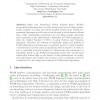Free Online Productivity Tools
i2Speak
i2Symbol
i2OCR
iTex2Img
iWeb2Print
iWeb2Shot
i2Type
iPdf2Split
iPdf2Merge
i2Bopomofo
i2Arabic
i2Style
i2Image
i2PDF
iLatex2Rtf
Sci2ools
129
Voted
HPCC
2007
Springer
2007
Springer
Towards a Complexity Model for Design and Analysis of PGAS-Based Algorithms
Many new Partitioned Global Address Space (PGAS) programming languages have recently emerged and are becoming ubiquitously available on nearly all modern parallel architectures. PGAS programming languages provide ease-of-use through a global shared address space while emphasizing performance by providing locality awareness and a partition of the address space. Examples of PGAS languages include the Unified Parallel C (UPC), Co-array Fortran, and Titanium languages. Therefore, the interest in complexity design and analysis of PGAS algorithms is growing and a complexity model to capture implicit communication and fine-grain programming style is required. In this paper, a complexity model is developed to characterize the performance of algorithms based on the PGAS programming model. The experimental results shed further light on the impact of data distributions on locality and performance and confirm the accuracy of the complexity model as a useful tool for the design and analysis of P...
Address Space | Complexity Model | Distributed And Parallel Computing | HPCC 2007 | Programming Languages |
Related Content
| Added | 07 Jun 2010 |
| Updated | 07 Jun 2010 |
| Type | Conference |
| Year | 2007 |
| Where | HPCC |
| Authors | Mohamed Bakhouya, Jaafar Gaber, Tarek A. El-Ghazawi |
Comments (0)

